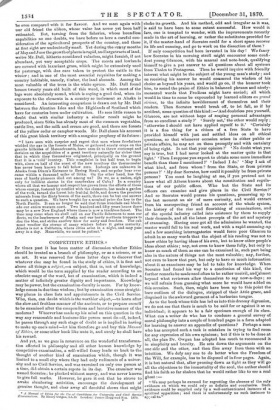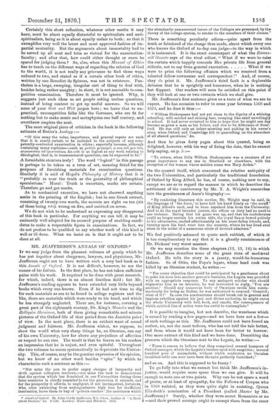COMPETITIVE ETHICS.*
IN times past it has been matter of discussion whether Ethics should be treated as a branch of philosophy, or as a science, or as an art. It was reserved for these latter days to discover that whatever else may be found in the study of ethics, it is first and above all things a subject,—a subject, that is, not of knowledge, which would be the term supplied by the reader according to an obsolete usage of the word, but of examination, which is indeed a matter of infinitely greater dignity and importance. Knowledge may be power, but the examination-faculty is more. For by know- ledge comes in due time wisdom ; but by examination come straight- way places in class lists and appointments in the Civil Service. Who, then, can doubt which is the worthier object,—to learn after the slow and fruitless manner of the ancients, or to prepare oneself to be examined after the compendious and lucrative manner of the modems? Whoever has made up his mind on this question in the way any reasonable and business-like person must do—if, indeed, he passes through any such stage of doubt as is implied in having to make up one's mind—let him therefore go and buy this Manual of Ethics, or some other book like unto it, and surely he shall have his reward.
And yet, as we gaze in reverence on the wonderful transforma- tion effected in philosophy and all other human knowledge by competitive examination, a self-willed fancy leads us back to the thought of another kind of examination which, though it was limited to a small city where they had only rudiments of a univer- sity and no Civil Service, and was exercised on only one person at a time, did obtain a certain repute in its day. The examiner was named Socrates ; he plucked without mercy, and was never known to give full marks. However, he gave it out that he strove to awake slumbering activities, encourage the development of genuine thought, and clear away all deceitful shows that might • A Manual of Mice for the Use of Candidates for University and Civil Service Examinations. By Henry Owgan, LLD. Loudon: James Hogg and Son. 1870. •
choke its growth. And his method, odd and irregular as it was, is said to have been to some extent successful. How would it fare, one is tempted to wonder, with the improvements recently made in the art of learning, or rather the substitutes provided for it, if the master-hand of Socrates could for a short space recover its life and cunning, and go to work on the dissection of them ?
If only competition had been invented in his day ! We fancy how Socrates in his morning stroll might encounter some confi- dent young Glaucon, with his manual and note-book, qualifying himself to give a pat answer to all questions about all systems from Thales to Protagoras. Then he would inquire with friendly interest what might be the subject of the young man's study ; and on receiving his answer he would commend the wisdom of his choice as beyond his years, and would go on, if the humour took him, to sound the praise of Ethics in balanced phrases and nicely- measured words that Prodicus might have envied; all which
would in time to come be expounded by learned editors an grand serieux, to the infinite bewilderment of themselves and their
readers. Then Socrates would break off, to let fall, as if by accident, some question of this kind :—'And doubtless you yourself, Glaucon, are not without hope of reaping personal advantages from so excellent a study?' ' Surely not,' the other would reply ; 'otherwise I should not have applied myself to it.' Certainly it is a fine thing for a citizen of a free State to have provided himself with just and settled ideas on all ethical questions, so that whenever occasion arises in either public or private affairs, he may act on them promptly and with certainty of being right. Is not that your opinion?' ' No doubt what you say is true, but I had never looked at the matter quite in that light." Then I suppose you expect to obtain some more immediate benefit than those I mentioned?' ' Indeed I do.' 'May I ask of what kind, and from whom ? from the State, or from private persons?' ' My dear Socrates, how could it possibly be from private persons? You must be laughing at me, if you pretend not to know what all Athens knows about the constitution and regula- tions of our public offices. Who but the State and its officers can examine and give places in the Civil Service?' And so Socrates would pursue his questions, preserving up to the last moment an air of mere curiosity, and would extract from his unsuspecting friend an account of the whole system, the history of the rise and flourishing of examinations, and of the special industry called into existence by them to supply their demands, and all the latest precepts of the art and mystery of cramming. Having once got all the admissions he wanted, the master would fall to his real work, and with a rapid summing-up and a few searching interrogatories would force poor Glaucon to admit in so many words that the object of his reading was not to know ethics by having ideas of his own, but to know other people's ideas about ethics ; nay, not even to know those fully, but only to know so much of them as one can be examined in, such part being also in the nature of things not the most valuable ; nay, further, not even to know that part, but only to have so much information about it as examiners may be led to take for knowledge. When Socrates had found his way to a conclusion of this kind, the further remarks he made used often to be rather uncivil, and:almost beyond what reviewers allow themselves to say now-a-days ; so we will refrain from guessing what more he would have added on this occasion. Such, then, might have been up to this point the bare outlines of the dialogue, stripped of their Attic grace, and disguised in the awkward garment of a barbarian tongue.
As to the book whose title has led us into this dreamy digression, we do not see that there is much to be said for or against it as an individual ; it appears to be a fair specimen enough of its class. What can a writer do who has to condense a general survey of moral philosophy into a couple of hundred pages in a form adapted for learning to answer an appendix of questions F Perhaps a man who has accepted such a task is mistaken in trying to find room for any expression of his own opinions ; but if this is to be done at all, the plan Dr. 0 wgan has adopted has much to recommend it in simplicity and brevity. He sets down the arguments on the one side and the other, and then flies away from them with an
intuition. We defy any one to do better when the Freedom of the Will, for example, has to be disposed of in four pages. Again, it is but natural that, after pressing down as tight as they will go all the objections to the immortality of the soul, the author should find his faith so far shaken that he would rather like to see a real ghost :— c, We may perhaps be excused for regretting the absence of the only evidence on which we could rely as definite and conclusive. Such evidence could be supplied only by a well-authenticated instaoce of a spiritual apparition ; and there is unfortunately no such instance to
eal to."
Certainly this short reflection, whatever other merits it may have, must be about equally distasteful to spiritualists and anti- spiritualists, being as it is about equally unfair to both ; so that it exemplifies very well the latest and most approved fashion of im- partial neutrality. But the arguments about immortality had to be served up all neat and trim as victual for the examination- faculty ; and after that, how could either thought or room be spared for judging them ? So, also, when this Manual of Ethics has to touch on the different ways of regarding the relation of God to the world, it is not really any grievance to find those ways reduced to two, and stated as if a certain other book of ethics, written by one Benedict de Spinoza, was not in existence. Pan- theism is a large, sweeping, irregular sort of thing to deal with, besides being rather naughty ; in short, it is not amenable to com- petitive examination. Therefore it must be ignored. Why, it suggests just such ideas as set people asking useless questions, instead of being content to get up useful answers. So we will none of your Gott und Welt jargon here ; we leave that to un- practical, uncompetitive folks like the Germans, who are fit for nothing but to make music and metaphysics one half century, and overthrow empires the next.
The most original piece of criticism in the book is the following estimate of Butler's Analogy :— 'Of this essay the value, importance, and general repute are such that it is nearly certain to be included in the subjects of any com- petently-conducted examination in ethics; especially because, although "containing many sophisms—such as petitio princzPii, a non tali pro tali, .argunientune ad ignorantiant, &c.—it is as logical as any work relating to theological, that is, to transcendental questions, can be expected to be."
A formidable etcmtera truly ! The word "logical" in this passage is perhaps to be taken as a term of art, meaning fitted for the purposes of furnishing materials for examination questions. Similarly it is said of Hegel's Philosophy of History that it is "probably as near the truth as the generality of philosophical speculations." Moral : Truth is uncertain, marks are certain. 'Therefore go and get marks.
As to mechanical execution, we have not observed anything amiss in the printing of the English ; but in one Greek extract, consisting of twenty-two words, the accents are right on ten (six of these being zee), wrong on five, and omitted on seven.
We do not wish to be understood as expressing any disapproval of this book in particular. For anything we can tell, it may be eminently well adapted for its avowed purpose of enabling candi- dates to make a respectable figure in examinations. In fact, we do not profess to be qualified to say whether work of this kind is well or ill done. What we insist on is that it ought not to be done at all.



































 Previous page
Previous page